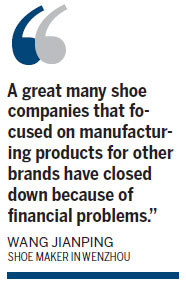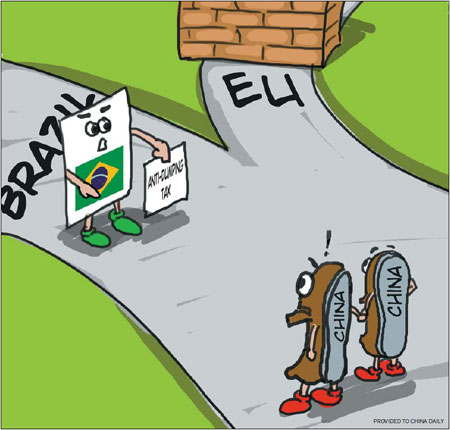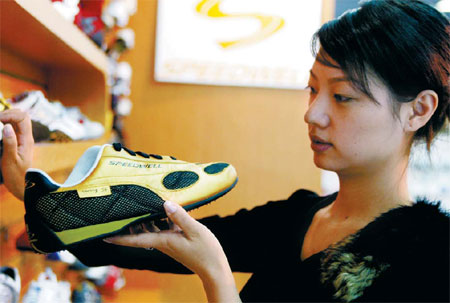Down at heel, not down in the dumps
Updated: 2012-01-16 08:02
By Yu Ran (China Daily)
|
||||||||
|
A visitor at a shoe exhibition in Beijing. Chinese enterprises, led by shoemakers in Wenzhou in Zhejiang province, are shifting their focus to domestic sales as external demand drops. A Jing / for China Daily |

Shoemakers in Wenzhou head for home to boost flagging profits
SHANGHAI - In 1991, Wang Jianping, a 50-year-old shoemaker based in Wenzhou in East China's Zhejiang province, set up his own workshop with a few workers, mostly relatives and friends, using basic tools to produce 300 pairs of shoes a day for buyers from Russia and other Eastern European countries.
Disenchanted by what he called the "exploitation" by the middlemen, Wang did the unthinkable at that time: he bypassed the buyers and sold directly to stores in Moscow and other cities in the region.
Even in Wenzhou - a hotbed of entrepreneurs and risk takers - Wang stands out from the hometown crowd for the many daring exploits that have earned him the nickname "Kuang ren", which literally means "Wildman". He was the first among the many shoe manufacturers in the city to establish a factory overseas where the costs of labor and land were lower than at home. In 2004, Wang created a stir in Wenzhou and the neighboring regions by buying 90 percent shares of the brand Wilson Shoes s.r.l., an Italian manufacturer based in Milan, for its design expertise.
Always trying to bypass the "blood sucking" middlemen at home and abroad, Wang has expended great effort and spent a lot of money on brand-building and establishing a sales network in the Chinese market. The products from his factory, Hazan Shoes Co Ltd, which makes 15,000 pairs a day, are sold around the country under two brands, "Blue" for high-end goods and "Cherry" for the less expensive variety.
For years, Wang's business strategy was widely derided as "pointless" by his peers because overseas orders were flooding in, labor was plentiful and land was cheap. Despite narrowing profit margins, few entrepreneurs in this city - the shoe production capital of the world - have found any cause for complaint. They were happily racking up billions of yuan manufacturing shoes on contract for nearly all the world's top brands.
In 2010, the combined output of the entire Chinese shoe industry was 13 billion pairs. The number is impressive, but total output is estimated to have declined at least 20 percent from 2009, because of slow demand in major export markets such as the United States and Europe, according to industry sources.
In 2008, Wenzhou's shoe manufacturers began to feel the chill wind of the global economic slump and sensed that the good times were fading fast. Dwindling overseas orders, combined with the rising costs of labor and land, have trimmed profit margins to such an extent that many manufacturers are questioning whether it's still worth the effort. Some have called it quits and siphoned off their wealth into other endeavors, mainly property investment.
However, many are searching for ways to break out of this quagmire and have come to realize that Wang is not as mad as they thought. "Now they know I am smarter than them," said Wang. He added, "I sensed that the good times wouldn't last forever and made preparations for the inevitable rainy days."
But not even Wang could have foreseen an economic storm of such magnitude. More than 200 business owners in Zhejiang province are reported to have fled the country in recent months, leaving behind piles of debt and many unpaid workers. The pressure has even led to some factory owners taking their own lives.
However, the vast majority of Wenzhou entrepreneurs are now trying to pick up the pieces and build a new future for themselves and their enterprises, said Su Chaoying, director-general of the China Leather Industry Association in Beijing. Figures compiled by the association in 2010 show that the average cost of labor in other emerging markets, including India and Vietnam, is about half that in China. The figure is even lower in many African countries.
Of course, the footwear industry is not the only one feeling the recessionary pinch. A survey of all industries situated in Wenzhou, conducted in September last year by the ciy's municipal government, indicated that 20 percent of those interviewed said they were having problems coping with rising production costs.
Su said that the best way for the Chinese footwear industry to regain momentum is to focus on brand-building and the production of quality high-end products, rather than attempting to compete with other countries in the mass market for cheaper shoes.
Many industry insiders agreed. "We've seen a decline in orders from international clients in the past couple of years, so, since last year, we have switched our main focus away from the export trade to the domestic market because the advantages of low production costs in China have weakened," said Huang Guoqing, the manager of Wenzhou Litong Shoe Trading Co Ltd.
He added that an increasing number of companies have started to target the domestic market with their own brands to make up for the losses they've suffered in the export market, especially after some countries imposed extra taxes on Chinese products. Brazil and EU, for example, have both imposed anti-dumping duties on Chinese-made shoes.
Until recently, Litong was primarily an original equipment manufacturer (OEM), devoting 70 percent of its efforts to making cheap shoes for companies in countries such as Germany, Italy and the US. However since 2009, the company has reduced that figure by 30 percent to produce a 60/40 split in production for the domestic and overseas markets and is focusing on promoting its own brand.
"I don't want to take the huge risk of taking our own brand out of China before trying it in the domestic market, which I think is the best way of creating brand awareness among local sellers," said Huang.
In order to reduce their labor costs, an increasing number of shoe manufacturers in coastal cities such as Dongguan in Guangdong province have moved their factories to inland regions such as Chengdu in Sichuan province and Qingdao in Shandong.
"We're planning to open a factory in Chengdu this year, and will move non-urgent orders to be manufactured in our three trial production lines there. Eventually, we will increase production at these lines if everything goes well," said Zhang Bei, the owner of Dongguan Santian Shoe Co Ltd, which has factories in Dongguan and Wenzhou.
Zhang added that since the beginning of 2010, when the rising costs of materials and labor were first highlighted as severe problems for the industry, an increasing number of companies have been trying to establish factories further inland as their future production bases.
To help manufacturers upgrade their brands, Wenzhou government established a plan in June to encourage shoe makers to create their own brands and establish factories in the low-cost regions, while keeping their head offices in the city.
"It has been suggested that most small and medium-sized shoe manufacturers in the city should focus on building their own brands, either in the domestic or global market, instead of being low-profit OEMs," said Xie Rongfang, secretary-general of the Wenzhou Shoe and Leather Industry Association.
A worst-case scenario will see factory closures if the companies concerned fail to turn a profit. In 2010, more than 2,000 enterprises closed down, nearly 40 percent of which were involved in shoe manufacturing.
Xie added that current conditions mean that a number of small or mini-sized enterprises (those employing between 100 and 200 staff) in the city will probably close for good.
However, some entrepreneurs are attempting to employ modern methods to sell their goods. Ye Hongxiong, the chairman of Zhejiang 360Mart E-business Co Ltd, has put Wenzhou's shoe companies on its online platform and created a "virtual" capital of shoes in China.
"Having 4,000 shoe manufacturers in the city and selling products at reasonable prices, Wenzhou has the advantage of high-quality brand-building and large-scale production accounting for nearly 60 percent of China's annual shoe output," said Ye, whose website launched its online shoe section in August, selling more than 40 brands, most of which are made in Wenzhou.
As China's largest Business-to-Consumer online shopping site, 360Mart's sales platform is under expansion at the moment and is in negotiations with nearly 1,000 shoe manufacturers to sell their products online.
"I want to introduce 'Made in Wenzhou' shoe brands to the country and the world to help the industry in the city recover from the downturn and achieve a healthier growth path," said Ye, who used to manufacture and sell stationary.
He added that he aims to not only focus on the e-business for shoes, but also wants to gain wider recognition for Wenzhou-based companies.
"I've noticed that a great many shoe companies that focused on manufacturing products for other brands have closed down because of financial problems, which is not a good sign for the industry," said Wang.


 Relief reaches isolated village
Relief reaches isolated village
 Rainfall poses new threats to quake-hit region
Rainfall poses new threats to quake-hit region
 Funerals begin for Boston bombing victims
Funerals begin for Boston bombing victims
 Quake takeaway from China's Air Force
Quake takeaway from China's Air Force
 Obama celebrates young inventors at science fair
Obama celebrates young inventors at science fair
 Earth Day marked around the world
Earth Day marked around the world
 Volunteer team helping students find sense of normalcy
Volunteer team helping students find sense of normalcy
 Ethnic groups quick to join rescue efforts
Ethnic groups quick to join rescue efforts
Most Viewed
Editor's Picks

|

|

|

|

|

|
Today's Top News
Health new priority for quake zone
Xi meets US top military officer
Japan's boats driven out of Diaoyu
China mulls online shopping legislation
Bird flu death toll rises to 22
Putin appoints new ambassador to China
Japanese ships blocked from Diaoyu Islands
Inspired by Guan, more Chinese pick up golf
US Weekly

|

|








